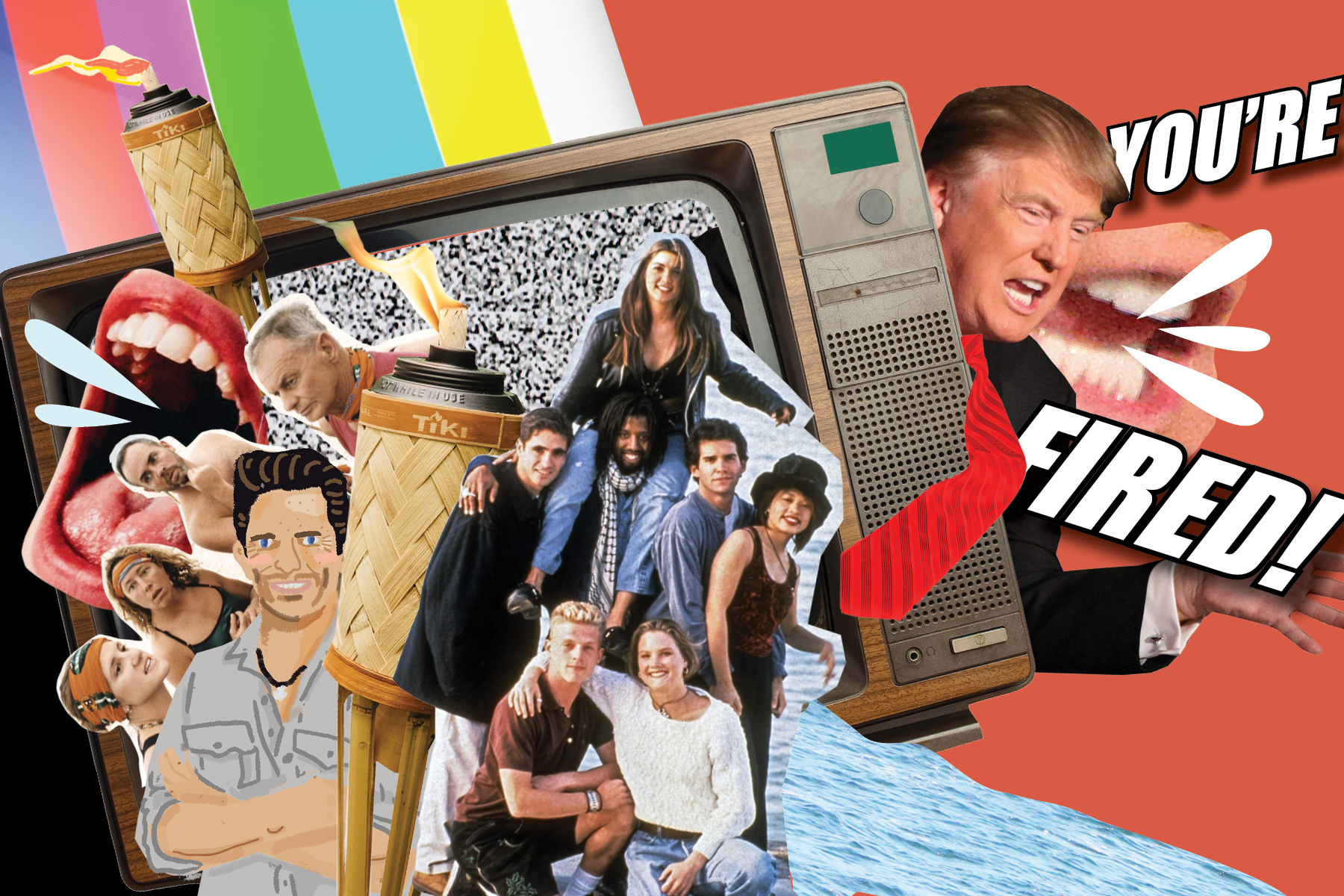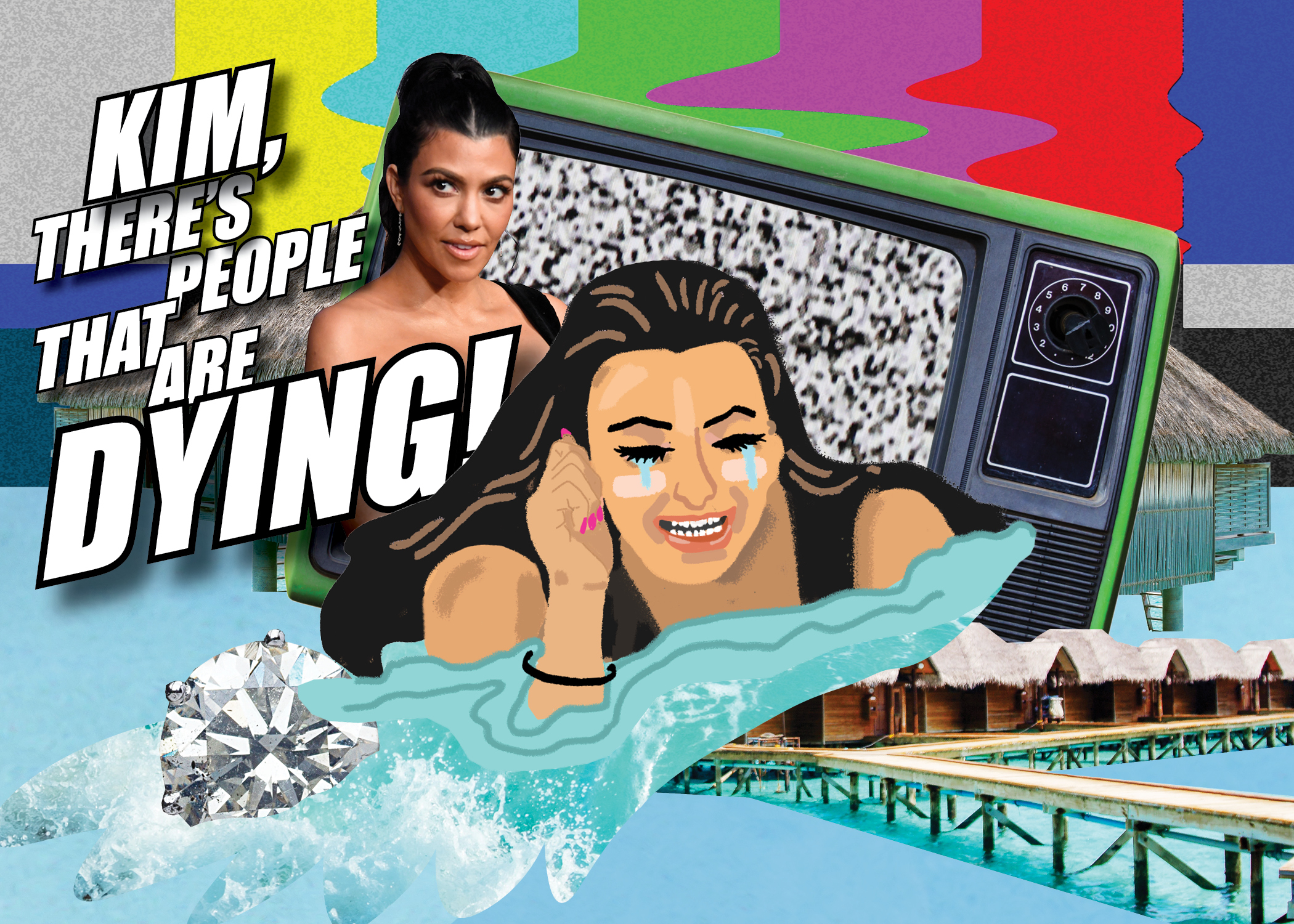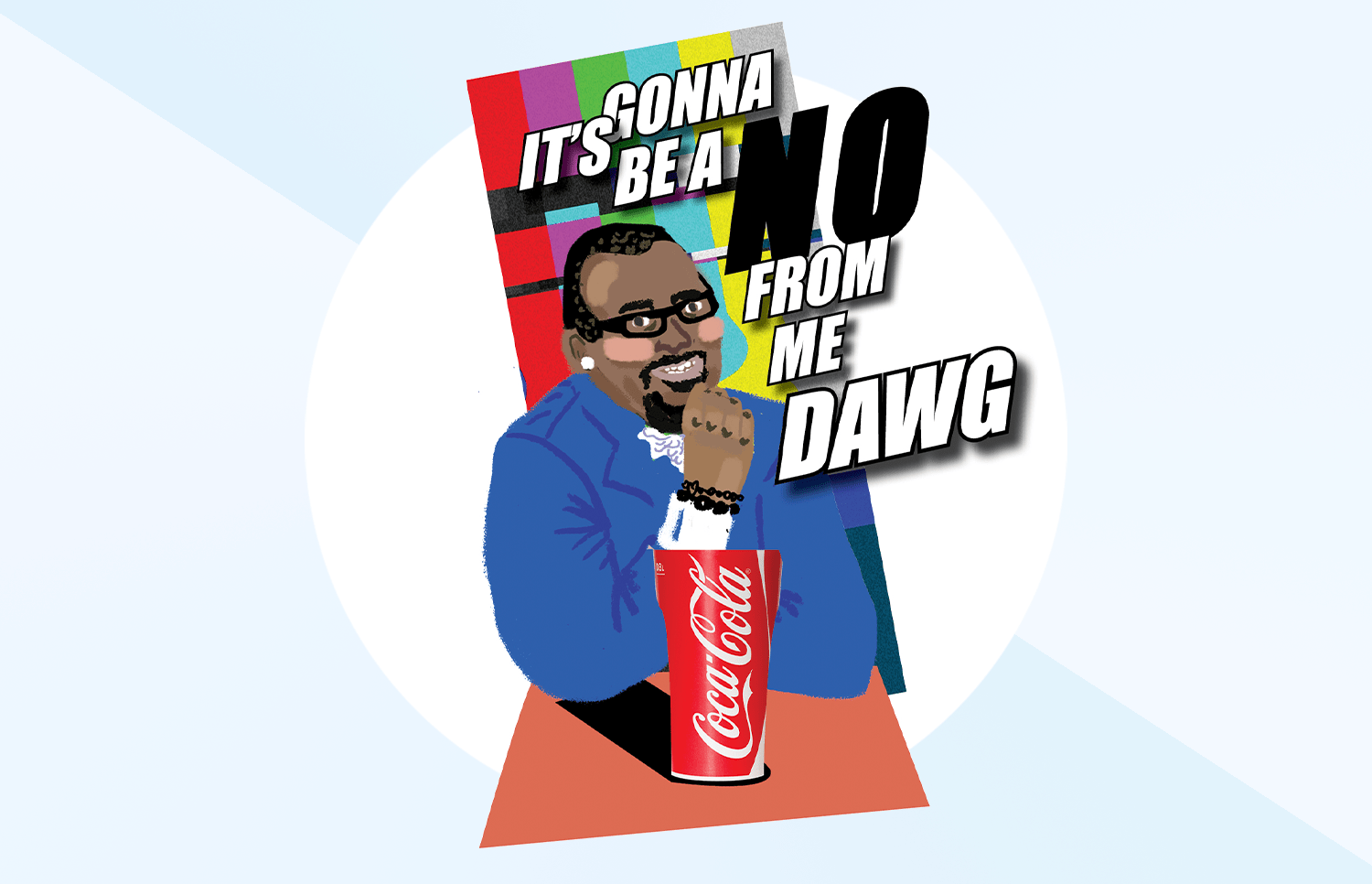“I’m not here to make friends. I’m here to win.” So goes the ultimate reality TV cliché, one popularized by the first season of Survivor, which got broadcast audiences hooked on competitions between telegenic “real people” cashing in the 15 minutes of fame that are the birthright of all Americans. Two decades later, the declaration has proven true of the genre itself. Reality series aren’t exactly well respected; critics, social scientists, and even fans never stop unearthing revelations about their crass manipulations and toxic tropes. Yet despite all the antipathy directed at these programs, they’ve conquered the culture and claimed their prize: our attention.
Reality TV has radically altered the landscapes of celebrity, politics, and power. It has made many people extremely rich; Kim Kardashian has a net worth of $1.8 billion. Reality stars have penetrated every corner of the entertainment industry, from Harry Styles, Kelly Clarkson, and Cardi B on the pop charts (appearing on The X Factor, American Idol, and Love & Hip Hop: New York, respectively) to Jennifer Hudson, Laverne Cox, and Emma Stone in Hollywood (first seen on Idol, I Want to Work for Diddy, and VH1’s In Search of the Partridge Family). West Side Story best supporting actress Oscar winner Ariana DeBose began her Broadway career following a stint on So You Think You Can Dance. While Project Runway launched Christian Siriano into the fashion stratosphere, Guy Fieri honed his everyman-gourmand persona on The Next Food Network Star. Without the Real Housewives, the Kardashian-Jenner clan, and the Selling Sunset cast, the pages of gossip rags would be virtually blank.
To state the obvious, reality TV also restored the cultural capital and catalyzed the political rise of our 45th President. In a 2016 interview that the critic James Poniewozik highlights in his book Audience of One: Trump, Television, and the Fracturing of America, a former supervising editor of The Apprentice explained the show’s aim: “Make Trump look good, make him look wealthy, legitimate.” Well, it worked. And Trump, the consummate reality star, brought the medium’s guiding principles—conflict, chaos, and public humiliation—to the West Wing
Read more: The 50 Most Influential Reality TV Seasons of All Time
But he was hardly the first to politicize the genre. As early as the ’90s, reality TV was confronting third-rail issues like racism, LGBTQ rights, abortion, homelessness, and AIDS—and that was just in the first three seasons of The Real World. For more than a generation now, reality stars have played as central a role in debates around how Americans should live as any cable-news pundit or newspaper columnist. Millennials and Gen Z have grown up expecting to see their identities, values, and struggles represented on series as ostensibly apolitical as Big Brother and Dancing With the Stars. Which helps to explain the social-media outcry around Trump Administration alum Sean Spicer’s cynical attempt to launder his image with a stint on the latter show.
As that example suggests, reality TV’s winning streak isn’t necessarily good news for society. To the extent that the U.S. has become a harsher, shallower, angrier, more divided place in the 21st century, reality TV—which has helped normalize cruelty, belligerence, superficiality, and disloyalty, and rewarded people who weaponize those traits—bears a share of the blame. As sociologist Danielle J. Lindemann notes in her recent book True Story: What Reality TV Says About Us: “for all of its extreme personalities and outlandish premises, reality TV reflects how regressive we truly are.” With that in mind, our list of reality TV’s most influential seasons is not a celebration of every show, or of the genre writ large. It’s a measure of the profound impact these charming hams, malignant narcissists, and the bizarre situations they keep choosing to inhabit have had on our world, for better and worse.

Although the term reality TV is only a few decades old, examples of the genre emerged virtually in tandem with the advent of television. Candid Camera, a small-screen adaptation of the radio program Candid Microphone that placed unwitting people in absurd situations and recorded their genuine reactions, aired its first season in 1948 and has been revived several times since. The culture-shaking 1973 PBS docuseries An American Family is known for anticipating the more frivolous docusoaps of the present. It also gave credence, through real-life story lines about gay identity and divorce, to a feminist slogan of its era: the personal is political. Two popular early reality titles, the police ride-along Cops and the paean to ostentatious wealth that was Lifestyles of the Rich and Famous, epitomized the tough-on-crime, greed-is-good zeitgeist of the Reagan ’80s and helped cement the genre’s implicitly conservative values.
The dominant format as we know it today, a composite of fly-on-the-wall scenes and cast members’ one-on-one interviews with producers, selectively edited to create a coherent narrative with clearly defined characters, coalesced in 1992 with MTV’s The Real World. The finale of the show’s first, Manhattan-set season found the cast of Gen X creatives breaking into the production room set up in their loft and discovering that they weren’t documentary subjects so much as characters in an unscripted soap opera. But The Real World’s manipulations would come to look quaint once a second wave of docusoaps surfaced in the mid-aughts, including Bravo’s Real Housewives universe and MTV’s own The Hills, which manufactured glamour and drama in equal measure.
Read More: The Story Behind Teresa Giudice’s Game-Changing Table Flip on Real Housewives
In all likelihood, the producers of those cable franchises had been emboldened by the reality revolution that remade broadcast prime-time around Y2K. A cohort of wildly popular—and, thanks to rampant product placement and bargain-basement production costs, incredibly lucrative—competition series, many of them imported from across the Atlantic, soon edged out scripted programming. Nothing makes a better case for the tenacity of the genre than the fact that so many of these shows are still airing, from Dutch import Big Brother to British import American Idol and the purely American invention that is The Bachelor. Cable channels have their share of enduring reality contests, too. Bravo has Project Runway and Top Chef. RuPaul’s Drag Race leveled up from Logo to VH1. Not only has MTV’s The Challenge been airing since 1998, but CBS has now also adapted the show’s format for its series The Challenge: U.S.A.
For a moment, in the late 2000s and early 2010s, amid a renaissance in high-quality scripted programming on cable, it looked as though the ascendance of paid platforms might lead to the extinction of reality TV. Instead, the rise of streaming has intensified the race to create as much addictive, populist content as possible, as quickly and cheaply as possible. As part of its potentially quixotic effort to become a stand-alone cable substitute, Netflix has built a global reality arsenal that ranges from sugary-sweet import The Great British Bake Off (which originally aired stateside on PBS) to diabolical dating experiments like Too Hot to Handle. Rival streamers have followed suit. After 20 seasons on E!, the Kardashian-Jenner family now licenses their domestic lives to Hulu. Voguing competition Legendary debuted as part of HBO Max’s 2020 launch slate. Between the imminence of the overleveraged streaming industry’s contraction and the increasing demand for cheap time fillers from linear networks hobbled by streaming, reality TV has a stronger financial foothold than ever.
Once dismissed as a noxious fad, reality TV has now hardened into an entertainment-industry institution. When social scientists study the effects of this entrenchment, the conclusions they reach are rarely encouraging. Reality shows have been found to exacerbate body anxiety, increase physical aggression, and mess with our expectations for romantic relationships.

It would be alarmist to suggest that watching an episode of, say, 90 Day Fiancé every once in a while is likely to warp our brains. But long-term exposure to dozens of shows that reinforce the same misperceptions are sure to have some impact on a person’s worldview. As media critic Jennifer L. Pozner notes In her influential 2010 book Reality Bites Back: The Troubling Truth About Guilty Pleasure TV, reality programming “has the power to influence our notions of normalcy versus difference, convince us that certain behaviors are ‘innate’ for different groups of people, and present culturally constructed norms of gender, race, class, and sexuality as ‘natural,’” rather than as a reaction to external circumstances. These messages pose a particular threat to young viewers, who may not have enough lived experience to differentiate between reality tropes and true sociopolitical insight.
It’s sobering to consider that Pozner published her book more than a decade ago, when Netflix was still years away from launching its first original series and the Real Housewives had colonized only four cities (a figure that is now up to 11, plus dozens of spin-offs and international versions). Since then, as earnest critiques of reality TV’s retrograde politics and exposés of its extreme fakeness have become old news, a knowing acceptance of the genre’s deceptions has set in—so much so that reality rom-coms like FBoy Island can now cheerfully send themselves up.
There’s plenty to enjoy about reality TV. And let me be clear: I do enjoy it, as much as anyone. Who could deny a person living in the maelstrom of 2022 the pleasure of shutting off their brain to stare at the scrupulously maintained bodies on Love Island? The genre isn’t monolithic, either. Along with the superstars that talent contests occasionally surface and the prescient conversations that have taken place on, for instance, a season of Project Greenlight that wrestled with the film industry’s white, male establishment, unscripted programs are often the first to bring poorly understood communities to the small screen. Sometimes, as in I Am Jazz, which has spent seven seasons following a trans girl’s coming of age, it even gives those subjects the respect they deserve.

But taking reality TV seriously also means holding it accountable for its frequent awfulness. Shows are still edited to reinforce stereotypes, from the vapid blonde to the angry Black person to the sassy gay man. Docusoaps thrive on the notion that women are vain, petty gossips. Conspicuous consumption is celebrated and obscene wealth is portrayed as an end in itself. While practically every heterosexual dating show traffics in gender essentialism, reality romances featuring LGBTQ casts remain few and far between (which explains why the lone sexually fluid season of Are You the One?, which aired in 2019, was a revelation). People with disabilities are treated like freak-show fodder. Asian and Latinx Americans remain underrepresented; recent attempts to compensate for this erasure, like Indian Matchmaking, have arguably hurt as much as they’ve helped. You can’t even watch The Masked Singer without worrying about humming along with an insurrection enabler.
Unless you’re fully off the grid, there’s no isolating yourself from these shows’ influence. I wouldn’t count on young people, who pore over the DIY entertainments of YouTube and TikTok, to bring about their obsolescence, either. Our current influencer economy might be based in social media, but it’s an extension of the original famous-for-being-famous model of reality TV and has thus given the genre a foothold with Gen Z. TikTok eminences Charli and Dixie D’Amelio now have their own Hulu series. No American has more Instagram followers than Kylie Jenner.
If we can’t stop this pop-culture juggernaut—and wouldn’t want to, even if we could—then we’ve got to make the effort to understand what its most indelible seasons and story lines are communicating to us about who we should be, what we should believe, and, once in a while, who will best embody our values in a political forum. Because reality TV may not be here to make friends, but it’s most definitely here to stay.
- Why Biden Dropped Out
- Ukraine’s Plan to Survive Trump
- The Rise of a New Kind of Parenting Guru
- The Chaos and Commotion of the RNC in Photos
- Why We All Have a Stake in Twisters’ Success
- 8 Eating Habits That Actually Improve Your Sleep
- Welcome to the Noah Lyles Olympics
- Get Our Paris Olympics Newsletter in Your Inbox